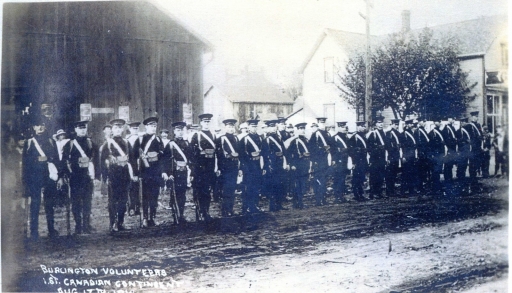A lecture series for the Burlington Historical Society looks back at the beginning of WWI. Centenary News writer Christopher J Harvie attended the opening of the series – and sent this report.
World War One Lecture
The Burlington Historical Society opened its 2014-15 programme of speakers and authors on Monday 8 September with a lecture focusing on the Ontario town’s participation in World War One. Held at the central branch of the town’s library, the evening’s guest speaker was Jonathan Vance, Professor of Canadian Military History at the University of Western Ontario.
Burlington Historical Society
Prior to Professor Vance speaking, the Society’s President, Alan Harrington, briefly outlined what the group, a non-profit run by volunteers since 1960, had recently achieved. In cooperation with the library, thus far they have been able to digitally archive and make available to the public over four thousand records of Burlington’s history, which dates back to its incorporation in 1873.
Among these records are valuable text and photographic documents of Burlington’s war, described as: “One of the most horrific events in humanity; and one of the most significant parts of Canadian history.”
Featured Guest
With degrees from McMaster, Queen’s and York Universities, Professor Vance is also a noted author, particularly for his book “Death So Noble”, examining Canada’s collective memory of the war in the decades that followed it.
He held a captive audience for his lecture, adhering to the technique he uses in his undergraduate classes, trying to “tell history as the people living saw it.” The style invoked anecdotal bytes and narrative descriptions to draw the listener in.
As he described the absence of politicians in Ottawa when the telegram notification of the war was received due to a holiday weekend, his quip that the Prime Minister was golfing and the leader of the opposition was “dangling his toes in the water off the dock” at his cottage, the room rippled with laughter, and the recognition that politicians haven’t much changed.
Canada and Empire
A great deal of time was spent by Professor Vance in describing the political climate of Canada at the outset of war. In fostering an understanding of this country’s role and reliance in Empire this illustration helps the modern thinker to reconcile Canada’s popular support of the war.
Given that many stories recently printed in national media overlooked this crucial factor, it was heartening that Professor Vance took care to clarify that in 1914 Canadians were not only politically linked to Britain but “conceptualised the Empire as a family; an idea held incredibly broadly in 1914.”
Describing how a small town (census records in 1911 total 1,830 people) responded to the unravelling events in Europe, it was remarked that the crisis in the Balkans that July “was as far away as Mars.”
Small Town Sacrifice
However, once war was declared, the entire country felt it had the opportunity to do great things. In less than two weeks from the declaration this town that “would have been perceived as a little parochial” was seeing 28 local Militia volunteers off to train for war with great fanfare, including bands, bunting, speeches and cheers for the King.
Of these initial 28, according to Professor Vance, at least four would not survive the war. In all, throughout the war, Burlington would send over three hundred men and nursing sisters to the war in Europe, some 16% of its total population – well on par with the national average. The Burlington War Memorial, beside City Hall lists 38 names of those who did not return.
An Informative Evening
Professor Vance took questions from the audience at the conclusion of his lecture. His ready command of information provided detailed responses to questions of preparedness, national unity and religious fervour. He was even gracious when one fellow, whom I’ve decided not to name, gently corrected him on a point where he neglected mention of the Indian Army as part of the Empire’s military strength. (I apologised after for putting him on the spot; he thanked me for pointing out his lapse.)
Burlington’s Historical Society meets for this lecture series the second Monday in a month in the Centennial Room at the Central Library Branch; and has upcoming events scheduled through to November 2014 to commemorate the war and its impact on the community.
The image is of the First Burlington Volunteers (Halton Rifles) taken 17 August 1914. It is courtesy of the Burlington Historical Society’s digital archive and is in the public domain.
© Centenary Digital Ltd and Author
Posted: by CN Editor
